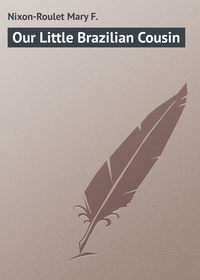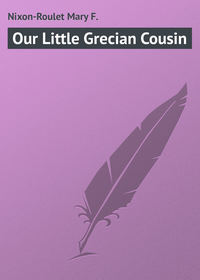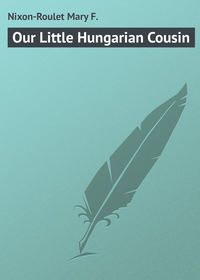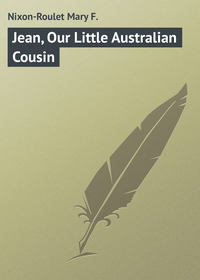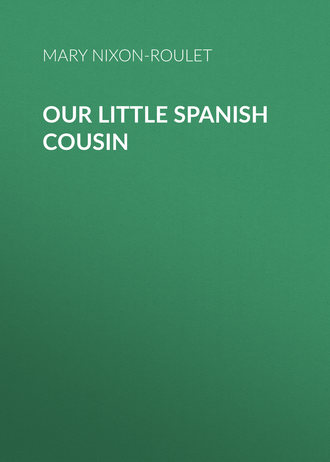 полная версия
полная версияOur Little Spanish Cousin
"See there, little sister," he said. "Is not that an easy way to get milk for the day?"
The goatherd was passing at the head of his procession of goats, looking neither to the right nor to the left, expecting his herd to follow him as gravely as he walked; but a peasant woman stole out of her door, and quietly milked one of the little beasts, who seemed not to object in the least, and took it so calmly that Pablo added, "That is not the first time there has been stolen milk for breakfast, I'm sure."
"See the poor beggar; do give him something, Pablo," said Juanita, touched by a wretched specimen of humanity who sat with blind eyes peering up at them as they passed. Pablo threw a perro chico into the beggar's outstretched hand, but he said:
"You must not be too sad for all the beggars, niña; there is an old rhyme:
"'The armless man has written a letter,The blind man finds the writing clear;The mute is reading it aloud,And the deaf man runs to hear.'"Oh, Pablo, may we have some horchata?" cried Fernando, and his brother stopped to purchase some of the snowy, chilly, puckery stuff, and they enjoyed it greatly. Fernando ate too hastily, and his brother said:
"Quita, quita! You must not act so! You are as bad as the king when he was a baby and put his knife in his mouth. His governess said to him, 'Kings do not eat with their knives,' and he haughtily replied, 'This king does!'"
"Indeed," said Fernando, pertly, "the king is my cousin, so it says in my history book that all Spaniards may say."
"He is your cousin, that is, you must love him as your own blood; but say, rather, 'All equal below the king,' and put him ever first. Remember that your fathers have died for the Kings of Spain, and we may have a chance to show our loyalty yet," and Pablo's bright face clouded a moment.
"Listen to the music; there goes the military salute! The king has come, and by the time we reach the Alhambra he will be on his way hither. Get up, Babieca," and he hurried the little donkey along until they reached the top of the hill and found Antonio waiting for them, his face flushed and eager.
"He will pass here," he cried, "beneath the Gate of Justice, and my father says we may stand just behind the guard upon the wall; there could not be a better place."
"How nice that will be!" cried Juanita. "And where is Pepita?"
"There, awaiting you," Antonio answered. "I will take care of Babieca and return," and he led the donkey away, coming back in a few moments, and they all waited impatiently.
Spaniards all love a spectacle, and the young folk could hardly restrain themselves as they heard the strains of music coming nearer and nearer. At last the cavalcade came in sight, – first a troop of soldiers, then a band playing the Marcha Real, then a mounted guard keeping close to His Majesty's carriage. There he sat, the young king, a tall, slight youth, with a pale, proud face and great black eyes, sad, yet merry and tender; a patrician face in every feature, yet a lovable one, and one to arouse all of love and loyalty in his subjects, as the character of Alphonso XIII. arouses their respect and affection.
As the carriage paused at the entrance gate, the king looked up at the eager little group upon the wall and smiled. Juanita and Pepita flung into his carriage their huge bouquets of flowers and to the girls he threw a kiss; but Fernando and Antonio stood up very straight and saluted gravely, and with a smile in his eyes, but with grave lips, the young king raised his hand to his hat and gave them in return the military salute. Then his carriage passed on, and bore him out of sight, but a shout went up from every voice, "Viva el rey!"
"When I grow up I shall be a nun and pray all the time for the king!" said Pepita.
"I shall be a soldier and fight for him," said Fernando, proudly.
"And I," said Juanita, "shall marry and have many children to fight and pray for him and for Spain!"
"Indeed, little sister, perhaps thou hast chosen the better part," said Pablo, laughing heartily.
"See!" cried Antonio, "there goes the carriage again, and hear how the people shout!" and as the bravas rent the air, the children shouted, too:
"Viva Espagna! Viva el rey! Dios guarda usted!"20
THE END1
Please God, my little godchild,That your life as pure may beAs the laughing brook which through the valley,Runneth ever limpidly.Your Godfather FrancescoWishes fervently."2
Picio was a man so ugly that his name has passed into a proverb in Spain.
3
The "housewife of Burguillos," who prided herself on her neatness, yet who was seen to spit in her frying-pan to see if it was hot enough.
4
"God help him."
5
"Jesus, Mary, and Joseph."
6
"An alms for the love of God."
7
Coppers.
8
"Pardon me, your Grace."
9
"For the love of God."
10
Perro Chico, little dog, name given to a five-centimo piece because of the little lion upon it.
11
He who has not visited SevillaHas not seen a marvel.12
Who has not seen GranadaHas seen nothing.13
In Spain stamps are sold in cigar-stores, not at the post-office.
14
I love my master.
15
When you are in the wilderness do not act ill, or when you are among people you will do likewise.
16
Spanish lovers stand beneath the windows of their sweethearts, to serenade them every night, and, as the windows are grated with iron, this is called "biting the iron."
17
"Santa Rita, Santa Rita, send us now,We pray thee fervently,A millionaire for a husband,E'en a blockhead though he be,E'en so, e'en so, e'en so,A millionaire for a husband,A blockhead though he be."18
"Sister Saltero, without vanity,I am lovely, I am salada,"salada meaning charming, witty, gracious.
19
The noblest of the Spanish grandees wear a golden key upon the hip to indicate that they have the right to enter the king's doors at any time.
20
"Long live Spain! Long live the king! God guard your Grace!"




